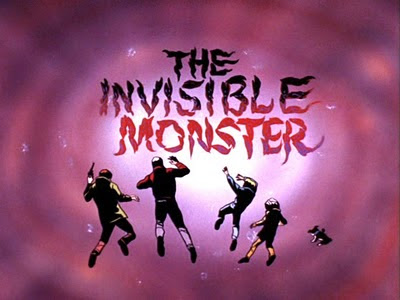Jonny Quest (1964-1965) was the only Hanna-Barbera cartoon with
a body count.
There were no fatalities on
The Flintstones, no one drowned
at an underwater concert on Jabberjaw, and even Wacky Races
got through a full season without any fiery crashes, despite Dick Dastardly’s
underhanded schemes.
But in the first episode of
Jonny Quest, “Mystery of the
Lizard Men,” more than twenty bad guys are wiped out by 11 year-old Jonny and
his teacher, Race Bannon.
At a time when violence on
film and television is once again being scrutinized, following too many
real-world tragedies, that may not be the best way to frame a tribute. But it’s
the genuine sense of danger in Jonny’s animated adventures, and his bravery and
resourcefulness in fighting back, that cannot be overlooked when asking why the
show still holds up so well. Put an 8-12 year old boy in front of this nearly
50 year old show today, and he will be just as captivated as the show’s
original fans.
Jonny Quest doesn’t glorify violence, but it’s honest about the
consequences of one’s actions. And ultimately, it’s greatest appeal lies not in brutality, but in wish fulfillment.
Kids back then, like kids
today, quickly tired of being told they’re too young for things, whether it’s a
motorbike or a video game. What made Dr. Benton Quest such a cool dad was he
never said that to Jonny and his friend, Hadji. They accompanied Benton and
Race on their dangerous adventures without anyone questioning the wisdom of that decision. Oh, sometimes they were told to stay back
at the base camp, but those orders were routinely ignored, as Benton and Race
knew they would be as soon as they left. Good thing, too, as these not-quite
teenagers saved the lives of their guardians in more than one episode.
Our dads didn’t have island
bases of operations, or fly to work in a Dragonfly jet. But we still wanted to
go to work with them, or join their one-on-one basketball games. We wanted to
know that our fathers thought, “Yeah, my son can handle this.” Too often that
wasn’t the answer we received. So to watch Jonny fire a machine gun at
cannibals alongside his father, or make a daring escape from a mad scientist’s
lair in a jetpack, was to get a glimpse at what it must feel like to be a kid
that was treated like an adult.
Like The Flintstones and Top Cat, Jonny Quest debuted in
prime time, and would eventually play on syndication on all three major
networks. As with so many of Hanna-Barbera’s shows it was gone after just one
season, but its 26 episodes remain the gold standard for animated adventure.
Every aspect of the series
was first class; the richly detailed animation by Doug Wildey had far more
depth and sophistication than the typical H-B output of that era. Hoyt Curtin’s
jazzy theme was not like the syrupy earworms of other animated or live-action
series of the day. This was music that could transfer intact into a James Bond
movie. Tim Matheson, later of National Lampoon’s Animal House, gave Jonny his voice, and helped make him a
regular kid in extraordinary circumstances with whom viewers could still
identify.
The only drawback to
watching Jonny Quest today is
the incessant yapping of Jonny’s dog, Bandit. Doug Wildey objected to the
addition of the character, but the boy-and-his-dog cliché was deemed necessary,
and now it’s the one element in the series that annoys rather than entertains.
There were later
incarnations, as there were with much of the H-B canon, but they have not been
embraced by fans and with good reason. Just the title cards on such original
classics as “The Invisible Monster,” “Turu the Terrible” and “The House of Seven
Gargoyles” are more stylish and appealing than any of the tired Quest retreads.
I suppose some mention
should also be made of the allegation that Jonny’s dad and Race Bannon were
TV’s first gay couple. Like the assertion that Shaggy filled the Mystery Machine with Maui Wowie smoke
between episodes, such speculation neither enhances nor distracts from the
viewing experience. Not that there’s anything wrong with that.


.jpg)

Lynda Day George enjoyed "Jonny Quest." The episode she enjoyed the most was "The Curse of Anubis."
ReplyDeleteNo offense, Mr. Hofstede, but I was surprised that you gave such a positive review to the 2004 DVD release of the original 1964-65 series. It's my understanding that some episodes were edited for content. I also understand there were issues with closing credits.